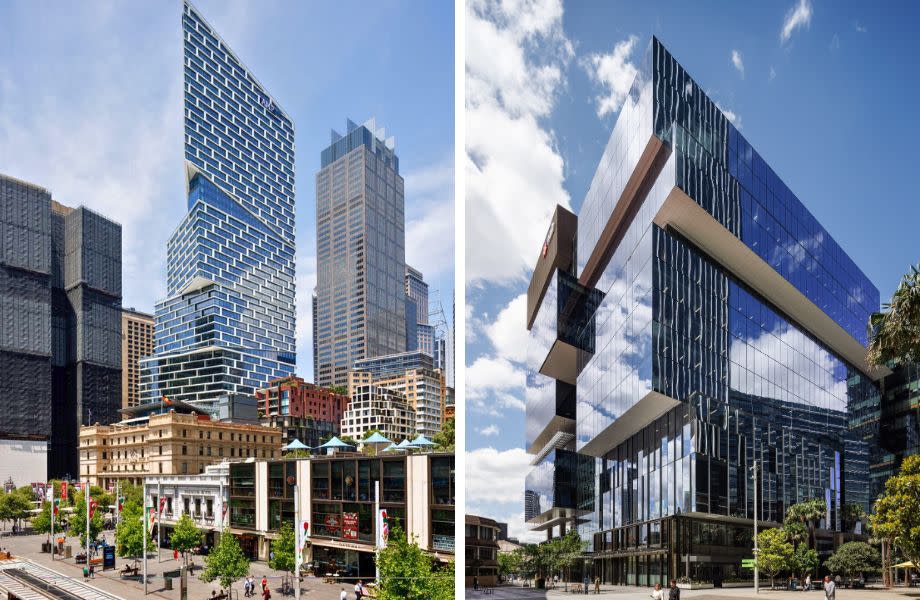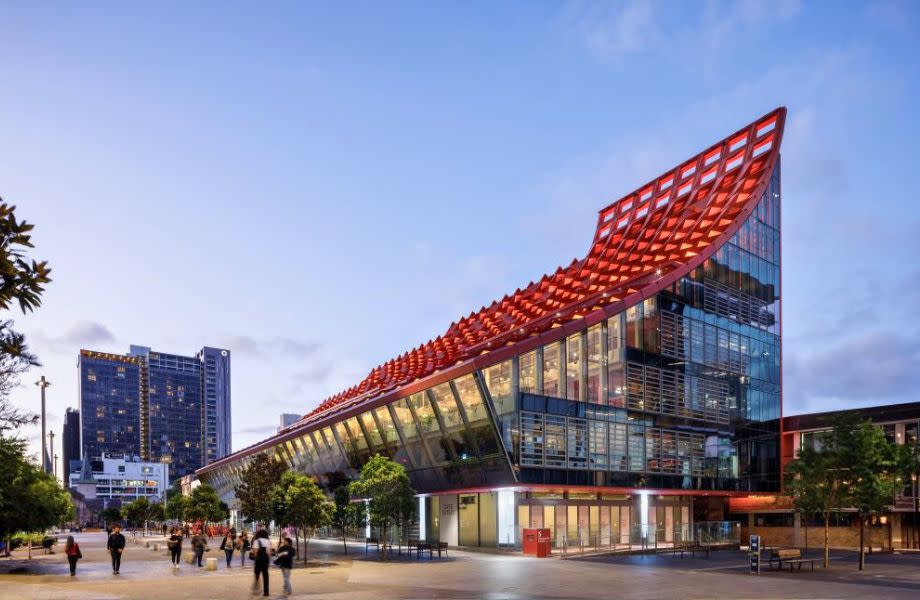InfraBuild Sustainable Steel Redefines Construction

Change—even necessary change—is rarely easy.
Among the growing appetite for more sustainable developments, the construction industry has an important role to play, with a series of unique challenges to innovate around.
One of these challenges is the sheer complexity of projects in the industry: to bring a project to fruition, builders, developers, engineers and designers need to come together in the decision-making process.
This means that sustainable solutions need to gain consensus from each of these parties.
This complexity isn’t unique to the construction industry but the construction industry does have a significant impetus for change: it’s responsible for about 20 per cent of Australia’s carbon footprint [footnote 1] and 40 per cent of carbon emissions globally [footnote 2].
As 2030 and 2050 decarbonisation targets approach, innovators within the industry are seeking new ways to tackle the decarbonisation challenge.
The benefits of adopting sustainable building practices are clear to see.
Demand for sustainable buildings is growing: it’s been documented in NSW that consumer demand for sustainable new and retrofitted apartment buildings is growing [footnote 3] faster than supply.
Looking towards the future, the regulatory landscape also has a role to play in accelerating change.
In Australia, proposed changes to the 2025 National Construction Code (NCC) call for embodied and operational carbon to be considered when assessing a building’s performance and compliance.
These calls come from research bodies such as the University of NSW and the Clean Energy Finance Corporation, as well as authorities including the Green Building Council of Australia and the Infrastructure Sustainability Commission.
Getting ahead of the regulatory curve stands to benefit developers who can demonstrate their commitment and strategies for reducing embodied carbon.
Redefining steel through sustainability
This means that, ultimately, it’s more than just the operating efficiency of buildings that will come under the microscope—it’s the materials and strategies used to create them that will need to change, too.
Steel as a building material has a complicated role in this: it’s almost unrivalled in its recyclability and its enduring strength contributes to long-lasting buildings.
However, making steel has traditionally been an emissions-intensive process and current efforts toward decarbonisation are high on the sustainability agenda.

A choice that makes SENSE
While climate action is at the forefront of all our minds, the construction industry is made up of multiple, often competing, interdependent parts. Finding an avenue for change needs to be one that all parties can agree upon.
The idea of universal adoption and agreement is the driving force behind InfraBuild’s new sustainable steel product range, SENSE Solutions.
As Australia’s largest processor and distributor of long steel products, and the nation’s only fully vertically integrated steelmaker, InfraBuild understood that to create real change across the industry, that change needed to be simple.
To get complex networks of stakeholders across the construction industry to participate in change, the solution needed to benefit everyone from engineers to steel fixers to developers and designers.
Using their industry experience, size and scalability, Infrabuild was able to find a solution that could empower all parties toward creating a more sustainable future.
Tackling this problem required investment in innovation and partnerships – leveraging InfraBuild’s own customer insights and engaging in research partnerships with Monash University and the University of New South Wales.
Through this, they created a range of lower-embodied carbon steel products that can improve a project’s environmental footprint without disrupting the processes of its stakeholders.
SENSE 600 delivers the same load capacity as a 500N reinforcing steel bar but with up to a 16.7 per cent reduction in materials.
Ultimately, this delivers up to a 35 per cent reduction in embodied carbon compared to its equivalent.
It’s also a fully recycled product, made from 100 per cent scrap.
For residential developments, the SENSE 600 Trench Mesh comes with similarly impressive sustainability credentials and is a direct substitute for Grade 500 Trench Mesh.

Rising above compliance hurdles
The SENSE Solutions range also helps developers tackle the persistent burden of non-compliant imported steel.
As developers are well aware, non-compliance often comes with budget and timeline consequences, as well as significant safety and building longevity concerns.
InfraBuild, as an Australian manufacturer, understands these compliance hurdles: SENSE 600 and SENSE 600 TrenchMesh are CodeMark certified and conform to AS/NZS 4671 and AS 2870. All products meet Australian compliance standards so there are no extra steps in the certification process.
With all these hurdles cleared, the Australian construction industry now has a path towards rapid change—an accessible and locally produced option to help lower the embodied carbon in their projects.
By providing clarity amongst the complexity of change, the construction industry’s transition to Australia’s sustainable steel appears all the more seamless.
Footnotes
1: Yu, et.al. (2016). The Carbon Footprint of Australia’s Construction Sector, Procedia Engineering, Volume 180, 2017, Pages 211-220
2: WBCSD (2018).WBCSD 2018 Report: Reporting Matters. Geneva: World Business Council for Sustainable Development.
3: Easthope, H., Palmer, J., Sharam, A., Nethercote, M., Pignatta, G. and Crommelin, L. (2023) Delivering sustainable apartment housing: new build and retrofit, AHURI Final Report No. 400, Australian Housing and Urban Research Institute Limited, Melbourne, https://www.ahuri.edu.au/research/final-reports/400, doi: 10.18408/ahuri7128201
The Urban Developer is proud to partner with InfraBuild to deliver this article to you. In doing so, we can continue to publish our daily news, information, insights and opinion to you, our valued readers.















